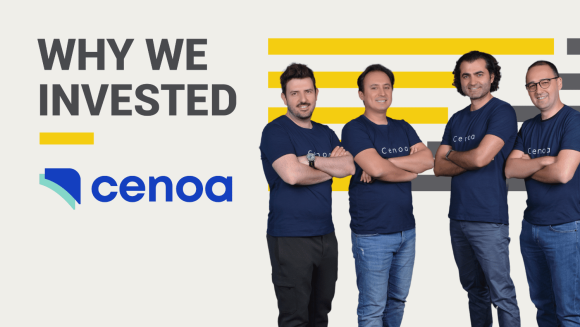Meet the Founder Empowering Businesses with Smart Contracts
Our new blog series, “Preparing for Lift-Off: 11 Founders Launching Bold New Startups,” features exclusive interviews with the founders from the latest cohort of our UFirst Summer Accelerator program. We’re sharing their stories and the daring ideas that are moving their companies forward. We’re excited to be working with them this summer, and hope you enjoy hearing about their journeys thus far and where they’re headed.
This week we’re joined by Steve Flanagan, founder of Bountium. Steve is actively redefining how business transactions are conducted, while creating new opportunities for aspiring entrepreneurs worldwide, by raising the bar for accountability via blockchain and smart contracts.

A seasoned software developer and independent contractor, Steve’s idea for a business management platform came out of his own encounters with unreliable business agreements — and a few less-than-reliable businessmen. Talking with other small business owners, he realized there was a dire need for something that could ensure that everyone involved in a business agreement — suppliers, managers, or anyone else — holds up their end of the deal. Read on to discover how he’s using blockchain to make that happen, and how he sees autonomous commerce reshaping the business world as we know it.
This is part 4 of 11 in our “Preparing for Lift-Off: 11 Founders Launching Bold New Startups” series created in partnership with growth marketing agency Ideometry. Tune in each Wednesday for another installment. Also, be sure to check out Part 3 with Karan Kashyap of Posh.
Watch Bountium Pitch at the 2019 UFirst Demo Day above!
Tell us a bit about Bountium.
Steve: Bountium is a platform that helps businesses manage their operations better through the use of smart contracts with suppliers or contractors. Today, when a business wants to engage suppliers or independent contractors, they have their legal team draw up a complex document with the hope that it will hold the other person accountable to the agreed services or goods.
With Bountium, we give them smart contracts that build in these accountability checks into the transaction itself.
It’s a smoother, more self-assuring and less complex process for the purchasing business. And for suppliers and contractors, they can get paid automatically upon completing their end of the deal, while resting assured that there won’t be any shift in the terms of the deal.
Additionally, through a supplier marketplace, the suppliers also benefit from being able to discover supply orders in this marketplace that is independent of the purchasing business and have the potential for an increase in revenue opportunities.
How did you come up with the idea?
Steve: This whole concept was built out of my own frustration as an independent contractor when I was doing software development related to blockchain. I sometimes had clients that would ask me to add extra features beyond the scope of our agreement, or clients that wanted to delay payments that we had already agreed on. It really disrupted my business. So this tool I’m creating would have been great to have at that time, and it would have really benefited my clients too — they could be 100% positive I’d do the job right, without having to micromanage me.
At what point did you recognize that you had something you could build a business around, as opposed to just an interesting idea?
Steve: Well, the frustrations of untrustworthy clients are always an annoyance, this idea really became real to me over one particularly bad case. This client refused to communicate with me once the payment deadline arrived, asked for extensions on payment when he did get in contact, and over the course of the extension, continuously added in feature requests that I wasn’t being paid to complete. After that, the client asked to delay paying me for 3 more months, only wanted to pay me in cash, and wanted me to travel from Boston to New York to collect my payment in-person. This was indisputably a ridiculous situation.
I so badly wished there was a platform that could help my business to survive. And I realized if it was that important to me, there had to be other contractors or even entire supply chain components that need a tool like this. I started talking to other contractors and learned they all had their own horror stories.
It was evident that a smarter contracting system would add peace-of-mind for all parties involved and reduce tremendous amounts of risk and waste of expenditures.
What does the world look like when Bountium succeeds?
Steve: Bountium will change how both businesses and suppliers discover one another and collaborate together. No longer will either have to depend on their personal networks for work and, with the ability to conduct automatic payments, collaboration between suppliers and the customer will be smoother.
For example, let’s say there’s a business that makes tables. They need a lumberjack to chop down trees for wood, a carpenter to assemble it, a polisher to finish it, and a delivery service to deliver the tables to ordering customers. That’s four different business they’ll need to work with. Instead of asking around, having to do a potential background check, worrying if the relationships are right, and going back and forth, the customer and supplier can use Bountium!
What is “autonomous commerce” and why is it important to you?
Steve: To me, autonomous commerce is when you buy something from someone, and you get what you paid for without extra work to make that happen. This already happens for a lot of consumers — when you buy something on Amazon, you almost always receive exactly what you expected to get, on your doorstep two days later! However, in my experience as a business owner, things aren’t so simple when you’re working with suppliers or contractors. When a business is trying to work with a supplier the order process involves a lot of back-and-forth due to unclear expectations. A business might ask you to build a web app, but there are tons of details — features, reliability, UI, etc. — that don’t get nailed down up front. With autonomous commerce, you make an order request that establishes those details up front and ensures that what you’ve requested is going to be executed properly. Once you have a way to define your request in objective terms, you know that your supplier’s only going to get paid when they meet those terms. That means you can relax knowing the project will get done without having to chase them down.
What drew you to UFirst? What are you hoping to get out of it?
Steve: I’ve bumped into several people from Underscore VC during my time at Northeastern. They’re very active in the Boston entrepreneur scene, and the way the team approaches backing new solutions has resounded really strongly with me- especially when it comes to blockchain solutions. I admired the approach Underscore took with their investment in Arwen, a decentralized crypto exchange that worked through solutions before selling to customers. They focused on making a well-thought-out, secure, and regulatory compliant product, and then executed on distributing it — it sounds simple but is an approach that a lot of blockchain projects could do better with. A similar approach with Bountium will make it fly.
Additionally, Underscore helps me think about the people who could really utilize Bountium, and how I can get it to them. I had a conversation with Richard Dulude, and the way he sees blockchain and who it’s going to impact is really exciting to me. I’d love to incorporate his vision as I try to bring Bountium to the people who need it most urgently. That direction is something that would really help, which is why I’m so excited to work with the Underscore team.
Being an entrepreneur, what are some of the biggest challenges you’ve faced along the way?
Steve: Working with a new technology like blockchain can be intimidating because of how unfamiliar most potential customers are with it. A lot of my customer interviews require me to clarify misconceptions about what I’m building with before we even get to discuss the product. And even further, you have all the variability involved with an evolving technology — there are quite a few technical questions in blockchain that are getting answered as we speak, and the answers will directly affect what Bountium looks like. But these concerns are simply a part of being early-to-market. I have a long term plan that relies on a lot of variables and hard work, but I’m the person to do it. I have the skillset and the drive to make Bountium a reality — but I’d be lying if I told you it looked easy. To combat this, I just keep my eyes on the next day ahead, what I need to accomplish, and how that can eventually turn into a product that people can use.
Starting a business is no easy task. What’s the driving force that gets you out of bed every day and motivates you to build your business?
Steve: If I can deliver on what I’m doing, it’s going to fundamentally address issues that cause a lot of people real pain. People lose jobs because we’re not doing business-to-business operations in an objective and fair way. Bountium can change that.
On top of that, I think this could make entrepreneurship more accessible. There’s a lot of people that could be running a business — a lot of creative people, really good designers and innovators — who may not have experience sussing out a tricky supplier. Bountium gives them the tools to work with those suppliers and hold them accountable. It lets them focus on their innovation. That’s what I want to do. I want to enable other innovators.
What’s the most valuable piece of advice you’ve received about being a founder?
Steve: Talk to customers as much as possible. I make a point to talk to potential customers at least 3 or 4 times a day.
Getting as many impressions of what I’m trying to do and what problems my customers face is really important to me. It’s so easy to get lost in your product and lose sight of what the customers are trying to tell you.
That’s what I try to keep focused on and what I’d encourage other founders to do.
Like what you hear and want to stay updated? Or better yet — want to help build it? Join the Bountium slack and chat with Steve as well other innovative minds making better business possible through Bountium!
Tune in every Wednesday for the next ten weeks as we release new interviews from our “Preparing for Lift-Off: 11 Founders Launching Bold New Startups” series.
Ideometry is a Boston-based full-service marketing agency serving a global client base. With a full suite of creative, development, and strategic services, Ideometry helps startups and Fortune 500 companies alike get the business results they’re looking for. If you’re doing something interesting, we’d love to hear from you. Get in touch with us at ideometry.com or email hello@ideometry.com







